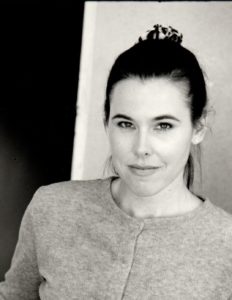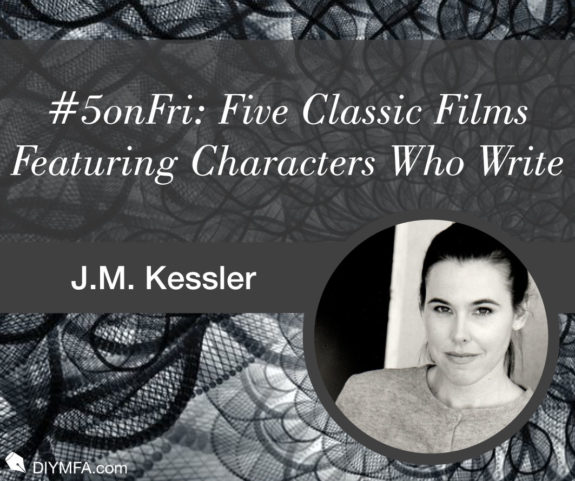I’ve been a classic film fan all my life. I’ve always loved backstage or meta stories, and the ultra-meta-aspect of writers writing about writers. In movies, there are few scenes that show writers writing, for the simple fact that watching someone write for 90 minutes isn’t entertainment. The focus is generally on how life influences and shapes the writer and their work, and vice versa. And in this regard, classic films aren’t far removed from contemporary sensibilities. They are still relevant with much common ground. Yet they are removed enough to offer a unique advantage—distance. Watching a character in the past dealing with a familiar writing challenge allows us to see the challenge with a healthy sense of detachment, giving us the space to create.
Here are five classic films featuring writers. (Spoilers Ahead.)
1. Girl Shy: 1924, Silent Comedy, story by Sam Taylor, Tim Whelan, and Ted Wilde, titles by Thomas J. Gray.
Harold (Harold Lloyd) is a shy, small-town boy. As we learn in a title (the frames that supply context or dialogue), “He was so afraid of women that he made a secret study of them, and the more he studied them the more he feared them.” His prescriptive non-fiction book, The Secret of Making Love, is based entirely on his fantasies. On the train to the publishers, he meets Mary (Jobyna Ralston), who is interested in his book. “I’ve decided that the young men of the world do not know enough about women,” he explains. But when the publisher laughs off his book as a joke, Harold brushes off the rejection as understandable. Later, the publisher decides to sell it as a humorous book. Initially indignant, Harold realizes that with the advance check he can marry his girl.
I love that Harold explores his superhero-self on the page. But his self-absorbed assumption leads to misidentifying his genre and experiencing imposter syndrome. Letting go of his fixed idea of the book allows it to find the perfect home, making his dream life real.
2. Little Women: 1933, Period Drama, screenplay by Victor Heerman and Sarah Y. Mason, novel by Louisa May Alcott
Alcott’s classic has had seven big screen productions between 1917 and 2019. In the 1933 Oscar-winning adaptation, spirited Jo March (Katharine Hepburn) writes sensation fiction for the local newspaper, providing a creative outlet for herself and extra income for her family during the Civil War. She goes to New York to hone her craft, and meets Professor Bhaer (Paul Lukas), who criticizes her artificial characters and plots. Although hurt, Jo is not defeated. “If I can’t stand the truth, I’m not worth anything.” When tragedy strikes the family, Jo returns home and writes from a place of depth and honesty to create a meaningful work of love.
Jo embraces her love for genre fiction, finding her niche and treating it like a job. Her early stories could be called practice writing, where she learns to complete projects and finds her voice. She’s then free to dig deep for the story only she can write.
3. The Ghost and Mrs. Muir: 1947, Romantic Fantasy, screenplay by Phillip Dunne, novel by R. A. Dick (aka Josephine Leslie)
Widow Lucy Muir (Gene Tierney) defies 1900 convention and rents a home of her own. Her first night there, Lucy meets the ghost of salty sea captain Daniel Gregg (Rex Harrison). When Lucy loses her income and is faced with returning to her in-laws, Daniel tells her to write his memoirs and publish under the name Captain X, and from then on calls her Lucia. Lucy takes his dictation (which puts her in proximity of being a ghostwriter for a ghost), but stops at obscenities, frustrating Daniel. “Hang it all, Lucia, if you’re going to be prudish, we’ll never get the book written. Now put it down the way I give it to you.” And she does. With the book published and her home secure, Daniel tells a sleeping Lucy that she will remember him as a dream, and that the book was her own idea.
In calling her Lucia, Daniel names Lucy’s creative identity. Despite her personal morals, Lucy knows she must use authentic language to tell the captain’s story. She has the self-discipline to put posterior in chair and finish the book, and publishing under a pseudonym gives her another kind of freedom, privacy. (And Captain Gregg proves it’s never too late to write that book!)
4. Sunset Boulevard: 1950, Film Noir, screenplay by Billy Wilder and Charles Brackett, and D. M. Marshman, Jr.
Screenwriter Joe Gillis (William Holden) is hard-up for work. Evading repo men, Joe pulls into the garage of an old mansion on Sunset Boulevard. Despite several red flags, Joe agrees to edit the screenplay of silent screen star Norma Desmond (Gloria Swanson). He’s moved into the mansion by the austere butler, Max, and while the project is just a job, he’s seduced by the perks. Soon, Joe is reacquainted with studio reader Betty who convinces him that one of his old stories has potential. He collaborates with her secretly after hours, noting, “It’s fun writing again.” But Norma’s jealousy forces his two worlds to collide. Joe admits his kept-man status to Betty and tells Norma he’s through. Norma shoots Joe, then makes her dramatic staircase descent into madness.
This cautionary tale reminds us to keep why we write front and center, and also the importance of vetting. Joe’s need for money blinds him to Norma’s instability and his own ruin. By the time Betty reminds him why he became a writer, Joe’s written himself into a dark corner with only one ending.
5. Hearts of the West: 1975, Western Comedy, screenplay by Rob Thompson
In 1933, naïve Iowan Lewis Tater (Jeff Bridges) leaves the family farm for Titan University, Nevada, from which he’s been taking a correspondence writing course, hoping to be the next Zane Grey. Upon arrival, he discovers that the university is a scam run by two crooks out of a hotel. But Lewis doesn’t let his anger best him. “Most of the good stuff I do comes out of times just like this. There’s no such thing as wasted time for a writer. He’s always thinking.” While he never tires of telling people he’s a writer, Lewis finds work as a stunt actor for B-westerns. He shows his manuscript to veteran stunt actor and former writer Howard Pike (Andy Griffith), who then tries to pass it off as his own work. Howard redeems himself in a tussle with the crooks. Lewis notes that it would make a great story.
Lewis falls for a classic writing scam, but prevails because of his steadfast belief that everything is copy. And he supports his writing with work that matches the atmosphere of his genre, feeding the muse rather than draining it.
Classic films show us that while tools of the trade and industry standards may change over time, writing will always offer the same challenges and rewards. They’re also wonderful when you just need a period of productive procrastination. (You’re welcome.) And if you need a laugh, watch Girl Shy here.

J. M. Kessler is the author of the children’s book, The Squirrelly Nut Gig, as well as short stories and plays. She has a BA in Theatre, and is a classic film fan, Whovian, knitter, and nature lover. Find J. M. at her website and on Instagram.







